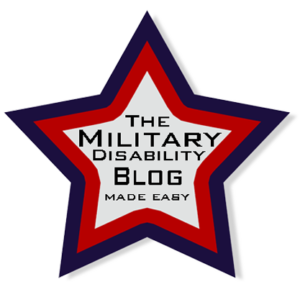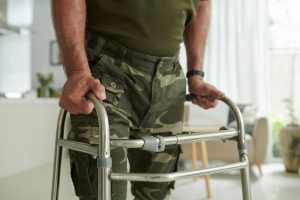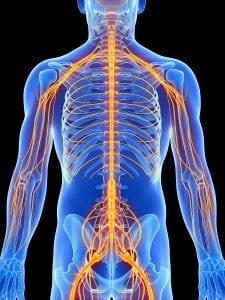On March 20, 2025, we will stop accepting new Military Disability Made Easy subscriptions. For more information about how this change may impact your subscription, click here
Symptoms and Diagnosis of Traumatic Brain Injury (TBI)
- Published:
- Last Updated: October 4, 2022

Traumatic Brain Injury (TBI) is an extremely complicated condition since the brain controls every function in the body. Depending on what part of the brain is injured and how severely, any part of the body could be affected in any number of ways. This means that symptoms can range from blurry vision to low blood pressure to numbness in the hands to depression.
TBI symptoms are commonly categorized into three different types: Cognitive, Physical, and Emotional and Behavioral.
Cognitive symptoms deal with the brain’s ability to think properly by interfering with its ability to process information, make decisions, and reason logically. Cognitive symptoms can include memory loss, decreased problem solving, learning difficulties, disorientation, confusion, and the inability to understand or communicate, etc.
Physical symptoms deal with the body’s ability to function. Physical symptoms are caused by either damage to the nerves or damage to the brain that interferes with its ability to communicate with the nerves. Depending on which nerves are affected, physical symptoms could affect any part of the body, from the heart to the toes. Physical symptoms can include the inability of the organs to properly function with the many symptoms that causes (like low blood pressure, anemia, urinary incontinence, etc.), numbness, paralysis, loss of coordination, etc.
Emotional and behavioral symptoms are psychological disorders like PTSD, depression, etc. Symptoms can include anger, anxiety, nightmares, trouble sleeping, worry, fear, etc.
The symptoms of TBI can remain individual symptoms or can develop into full-blown conditions themselves. For example, TBI can cause diagnosable conditions like PTSD, neurocognitive disorders like dementia, or even something like hyperthyroid heart disease (a condition of the heart that occurs when the thyroid produces too much thyroid hormone).
Because of the wide extent of conditions that can be caused by TBI, the VA requires satisfactory proof that a traumatic brain injury did occur and that a condition/symptom was indeed caused by the TBI in order for it to be given a VA Disability Rating.
While a TBI must be diagnosed and documented right when it first occurs, it doesn’t necessarily need to have been called “TBI”. Traumatic brain injury can include anything from a concussion to a shrapnel wound to the skull. As long as there is evidence in the military medical record of a brain injury that was traumatic (caused by something hitting the head), then it qualifies as TBI.
The VA cannot diagnose TBI after the fact. If there is no evidence of TBI in the military medical record, then the VA will not rate it. A vet can’t just walk in and claim to have been hit in the head while deployed. It must have been properly recorded, just like with any other medical condition, to be considered service-connected.
Some symptoms of TBI may not develop until months or even years after the original incident. In order for the VA to rate symptoms that develop after the vet leaves the military, there must be proof that they were indeed caused by the TBI that occurred while in the military. For example, it isn’t possible for a mild concussion to cause heart disease three years later since a mild TBI rarely has symptoms lasting more than a day or so. There must be clear medical connections between the severity of the TBI and the condition.
As long as the vet has proof of a TBI occurring during his military service, there are a few conditions that the VA will automatically consider caused by TBI if they develop after the vet leaves the military. These can be found on our Rating Secondary Conditions Caused by TBI page. For all other conditions/symptoms, there must be clear medical evidence that they were caused by the TBI in order to be rated.
For complete information on rating TBI for Military Disability, see our Traumatic Brain Injury (TBI) page.
Recent Posts
TDRL vs. PDRL—Which is better for disability benefits?
February 13, 2025
Leukemias and Multiple Myelomas NOW on the Presumptive List
January 9, 2025
Two MORE Conditions added to the Burn Pit Presumptive List
January 3, 2025
The 2025 VA Disability Rates are here!
December 2, 2024
About Us










8 Comments
Dr. Johnson,
I had a TBI in 1974 with encephalomalacia
I was rated 40% due to memory loss
does the va rate the actual encephalomalacia ( brain damage) ?
thanks
Hi Rick –
No, the VA really only rates the symptoms of the brain damage. Since memory loss is the main symptom, that was what was rating. If additional symptoms develop, they could rate those in addition.
If it is not diagnosed in my husbands military record, but there are statements from his unit and civilian doctor diagnosis ( but not until years after the fact) how likely is he to be awarded his appeal with those? It took me a few years to convince him to seek out the VA so he is feeling rather discouraged with his denial due to lack of records.
That evidence is weak at best. The VA legally cannot grant compensation without sufficient evidence. The diagnosis after separation doesn't really help at all. And the statements MIGHT help, but only if there are multiple ones that can show undeniable evidence. Without official medical records, however, it is still unlikely an appeal will succeed, but always worth a shot.
I had a parachute malfucntion in 1999 and was later medically discharged in late 2000 for injuries i had because of the hard landing. Since the incident i have had TBI symptoms but didn't even know what TBI was till a few years ago. I am currently seeing VA doctors to be screened for TBI and PTSD. If I am diagnosed with both can I apply for disibility benefits for those even though I wasn't diognosed while I was in service?
If you can show a clear and distinct link between the TBI and PTSD diagnoses and the original incident, then the VA may potentially grant service-connection. It is much more standard to do this with PTSD, so that shouldn't be a problem as long as the traumatic incident is service-connected. The TBI could also qualify as long as it is clear that this incident was the cause of the original TBI and that you did have consistent TBI symptoms since that time.
My TBI occurred while I was going through Pararescue training. The ones who treated me were certified paramedics but it wasn't documented when it happened. It was basically like going through BUDs. I have just now been diagnosed with TBI but I have been out for just over 10 years. How would I claim this now? I never knew any of this at the time of discharge or when I was going through the training.
If there aren't any incident reports, it's going to be tricky, at best. Without an official record, the best you could do is get a letter from your commander at the time detailing the events and how it affected you. A buddy letter from a peer that was present at the incident would also strengthen your case.
If these first-hand experiences are solid, then they might be enough for the VA to grant service-connection, although without official evidence, it could still be denied.